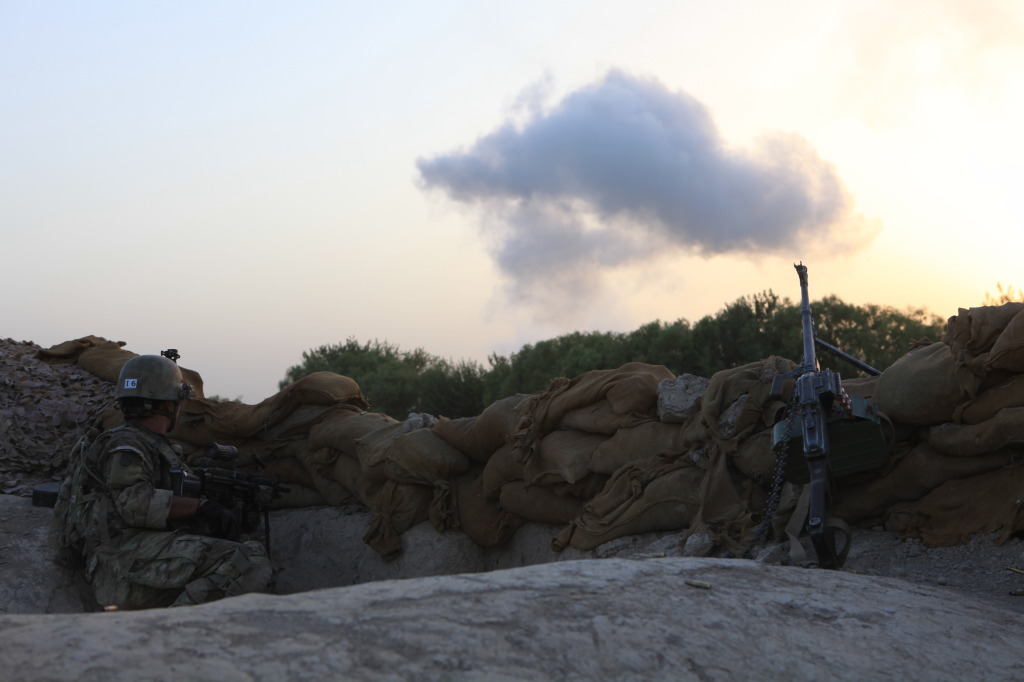And just like that it began. A few distant pops — poorly-aimed shots — gaining momentum and volume like a rising storm, the patter of rain, leading with the gunmen’s adjustments to ferocious snaps and cracks; bullets zipping past overhead. We ducked down.
“Here we go!” they shouted. A SAW gunner opened fire in the corner, his weapon chattering and spewing brass. The patrol leader relayed coordinates into his radio.
Suddenly a brief and terrific ripping sound shot overhead, so loud and so close it sounded as if the very fabric of the atmosphere were tearing. Me and the patrol leader flinched, looked at one another. He started laughing.
“That was fuckin’ close!” he said.
I shrunk down and dug ear buds out of my pocket (I’d learned their value from my first firefight, when my ears wouldn’t stop ringing until the next day). As I twisted them in, the noise of the world drowning away, I was jarred once again by a different proximity of gunfire, rattling in my chest, pounding like loud hammers. I looked back, peered up over the middle dome. A few Afghan policemen were shooting right behind us.
I stayed low and pulled out my camera. Murphy’s law would dictate that the last firefight of my deployment would involve Afghans shooting over my head from both directions. I stayed down and snapped some photos of the soldier next to me. He was shooting at the compound, his shells whirling over my head in golden blurs.
A zipping sound gave way to a loud puff. Rubble rained down on my Kevlar.
“Fuck!” someone shouted.
Back in the corner the SAW gunner was feeling his cheek. Dust was rising like smoke from the sandbag beside him, a gash across it.
“Did you see that?” he said.
“Are you OK?”
“Dude,” he said, unable to hide a grin. “A bullet just went right past my fuckin’ face!”
He said this with the same self-amazement one might use to describe an epic frat party.
“The shrapnel hit me in the cheek!”
I gave him the thumbs up and continued snapping photos. The chattering of the SAW resumed.
For good measure, I set down my camera and picked up my rifle, looked back for the barrel of a policeman’s AK-47. It was clear. I rose up on a knee and sighted in on the compound, a window rising shakily into my ACOG. I opened fire, the rifle kicking back in my shoulder, the shots loud and dull behind my ear plugs. I moved my sights to the tree line, where impacts erupted in flurries of dust, and opened fire. I shot until my bolt jammed back and my trigger went limp.
“Reloading!” I called out as I sat back against the dome, pulling a magazine from my flak.
“Oh, yeah!” said the patrol leader, clutching his trucker mic. “Shake and bake!”
The call was furthered by other soldiers: “Shake and bake! Shake and bake!”
“What’s a shake and bake?” I asked the SAW gunner beside me.
“A round of H.E. on top of a round of white phosphorus,” he shouted. “It creates a fuckin’ fire tornado.”
“Get down, guys,” said the patrol leader. “It’s gonna be danger close.”
I squeezed down between the domes, covering the back of my neck with one hand and my balls with the other.
“Dude,” said the patrol leader. I looked up. He was sitting beside me, leaning back against the dome. “It’s not gonna be that bad.”
“How close is danger close?”
A boom roared in the distance, rumbled across the valley. Almost immediately another followed.
Cheers erupted on the rooftop, the soldiers shouting and yipping like Rebels on the advance as explosions pummeled the tree line. Any American who treasures his safety should be thankful there are men who love combat so.
Soon the tree line was abloom with white columns of smoke writhing up into the dusk. The gunfire had silenced. We climbed down from the rooftop, packed up, and left.
It would be my last firefight, and it was a good one, as oxymoronic as that may seem. No one got hurt, but everyone got their adrenaline fix; one that is unlike any other. Not all the sex, drugs and Rock ‘n Roll in the world can achieve it.










COMMENTS